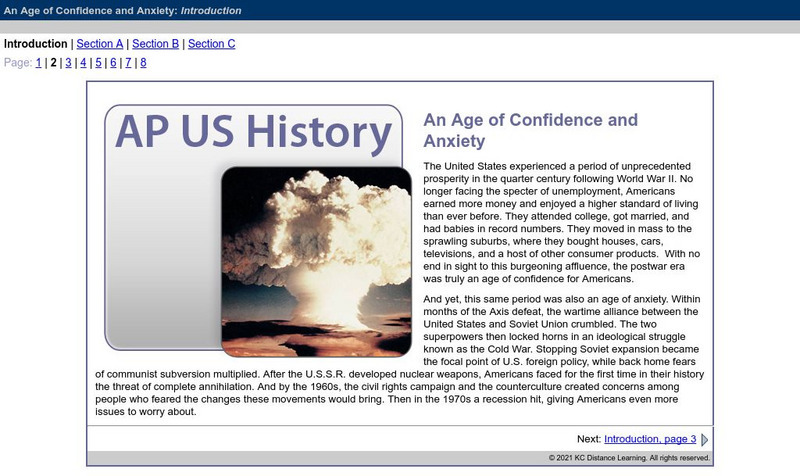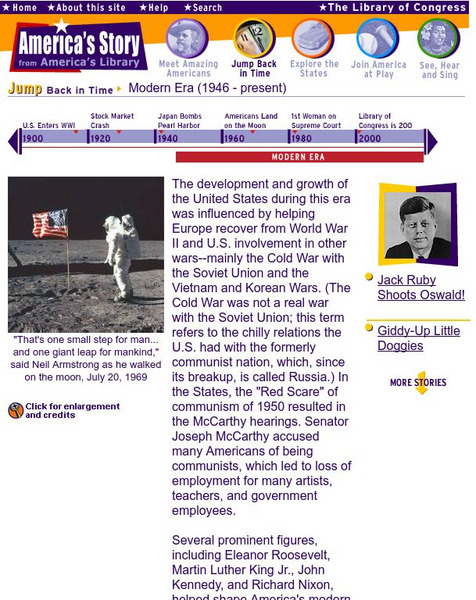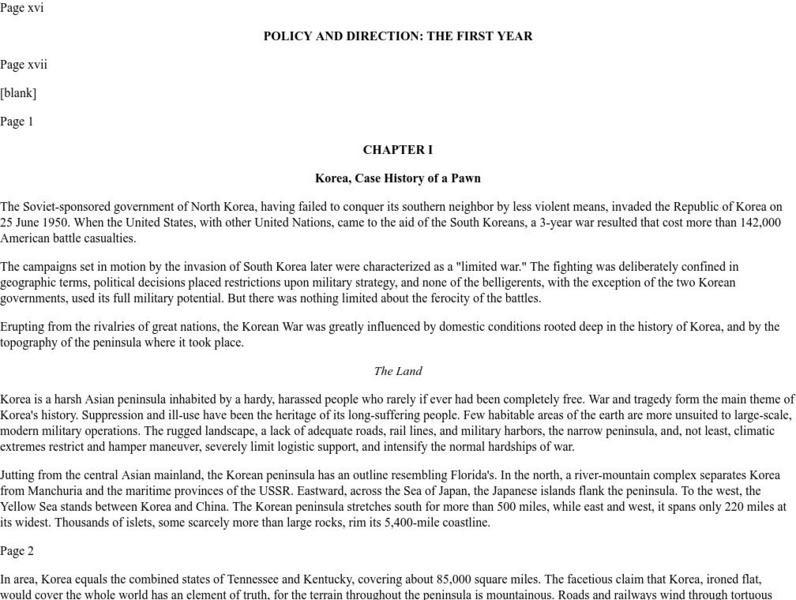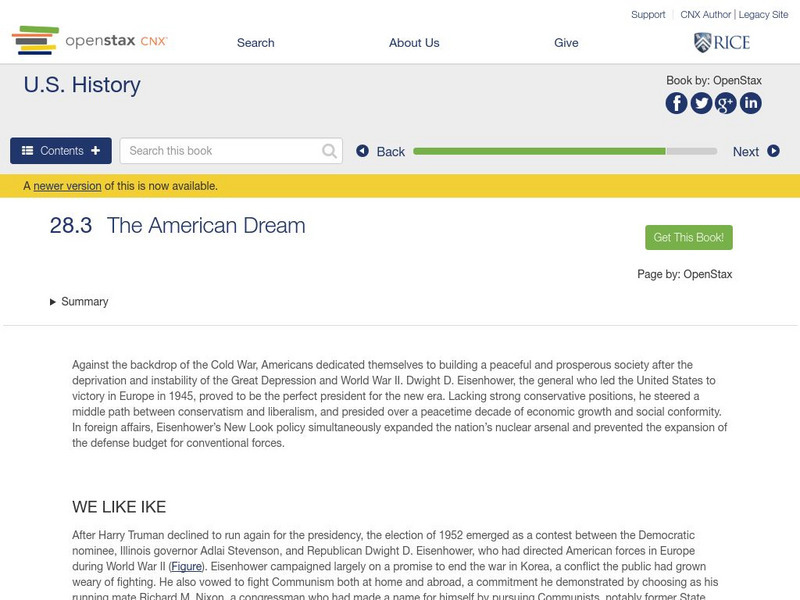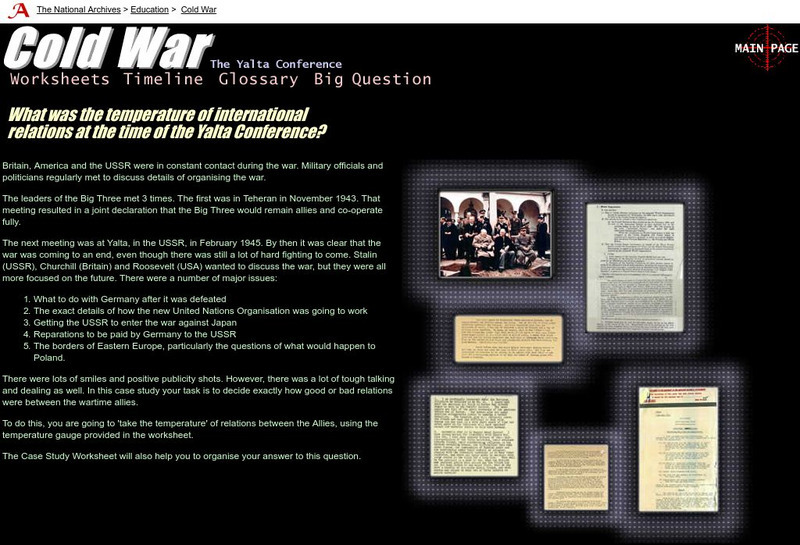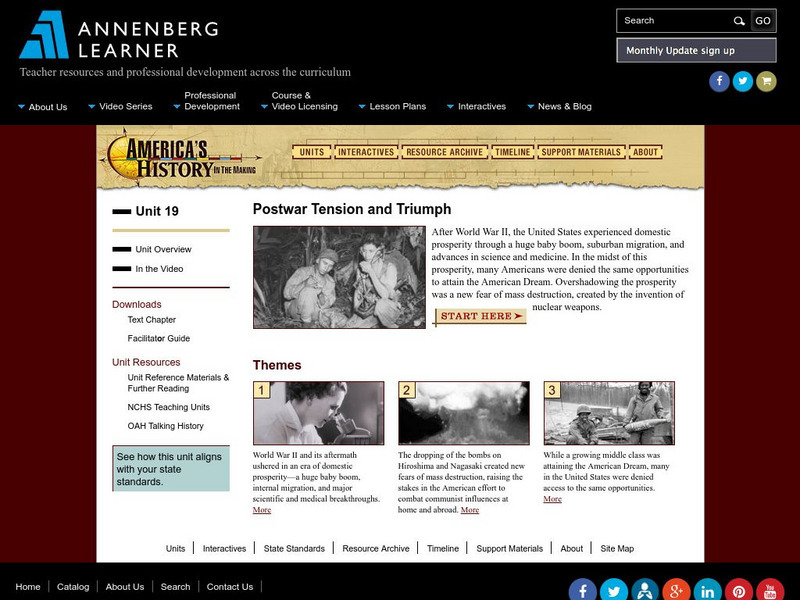Woodrow Wilson International Center for Scholars
Woodrow Wilson Center: Digital Archive: Cold War Origins
This collection of primary source documents discusses international relations during World War II and the years shortly after. It begins with the Molotov-Ribbentrop Pact signed in 1939 and ends with documents from the 1950's. The...
Department of Defense
Do Dea: Ap Us History: Unit 8: An Age of Confidence and Anxiety
This extensive learning module examines the United States' response to the global uncertainty and instability that followed World War II and the ways that marginalized groups challenged discrimination, and the counter-responses to their...
Country Studies US
Country Studies: The Polish People's Republic
This article discusses the Soviet Union's influence in Poland following World War II and during the Cold War.
Library of Congress
Loc: America's Story: The Modern Era
For a brief overview of the period after World War II until the present, visit this Library of Congress resource. Learn about the Cold War and the first man to walk on the moon.
ibiblio
Ibiblio: Soviet Archives Exhibit
This ibiblio.org exhibit discusses in detail the history of the Soviet Union. The site is grouped into two main categories with several sub-headings. One is Internal Workings of the Soviet System including: Repression and Terror: Stalin...
Other
St. Martin: Iron Curtain 1945 1947
This article discusses the development of the Soviet Union's Communist buffer zone after World War II and its evolution into the Iron Curtain of the Cold War.
Center for Educational Technologies
Nasa Classroom of the Future: Korean Enigma: Korea Divided
Explores the historical events that took place between the United States and the USSR to bring about the political division of Korea on the 38th parallel into north and south after the end of World War II.
Gilder Lehrman Institute of American History
Gilder Lehrman Institute: History Now: Anti Communism in the 1950s
[Free Registration/Login Required] An essay tracing the anti-Communist hysteria beginning in earnest at the end of World War II that resulted in Truman's federal Loyalty Security program and ending with McCarthyism in the 1950s.
The History Cat
The History Cat: World History: World War Ii
Learn about World War II history. Topics include Germany under the Nazis, appeasing Hitler, the Blitzkrieg, the bombing of London, and Berlin during the Cold War.
CommonLit
Common Lit: Text Sets: The Cold War
This is a collection of 16 Grade-Leveled texts (6-12) on the topic The Cold War. After America and the Soviet Union fought as allies in World War II, a new "cold" war emerged between the two superpowers characterized not by direct...
US Army Center
U.s. Army Center of Military History: Korea, Case History of a Pawn
This site from the U.S. Army Center of Military History provides information on Japan's control of Korea, the subsequent change of control to the United States following World War II, and the USSR's involvement.
Other
Facts About Germany: The Cold War
German authors provide an article about the Soviet Union's influence in Germany during the Cold War.
OpenStax
Open Stax: Post War Prosperity and Cold War Fears 1945 1960: The American Dream
Looks at the policies of President Dwight D. Eisenhower, both at home and abroad. Also examines changing gender roles in the 1950s, and the impact of suburbanization on America.
National Archives (UK)
Cold War: The Yalta Conference
Outline of proceedings that took place at the Yalta Conference. Features student questions.
US Army Center
U.s. Army Center of Military History: The Centennial: Omar Nelson Bradley
This lengthy biography of General Omar Bradley was written on the centennial of his birth. It traces his life as a military man through World War I, World War II, and Chairman of the Joint Chiefs of Staff. Included is a map that shows...
CPALMS
Florida State University Cpalms: Florida Students: International Conflicts: 1914 1975
This tutorial discusses four wars between 1914 and 1975 that the United States participated in. These include: World War I, World War II, the Korean War, and the Vietnam War. A PDF file of the tutorial is available.
Annenberg Foundation
Annenberg Learner: America's History in the Making: Postwar Tension and Triumph
Comprehensive teaching unit on tensions of the Cold War era: conflicts between domestic prosperity and unfulfilled expectations, ideals of conformity and individualism. Contains video and text materials, web interactives, student...
Khan Academy
Khan Academy: The United Nations
Discusses the formation of the United Nations after World War II as a way to provide a venue for resolving differences between countries and as an international peacekeeping organization.
Khan Academy
Khan Academy: Us History: 1945 1980: Start of the Cold War the Yalta Conference
Learn how the end of World War II contributed to the rise of the Cold War.
The History Cat
The History Cat: Cold War Germany
Describes what happened to Germany at the end of World War II and the start of the Cold War, how it was divided into East and West Germany with the construction of the Berlin Wall. Western countries worked to rehabilitate their half of...
Google Cultural Institute
Google Cultural Institute: Cold War
Learn about the Cold War, a period of geopolitical tension between the United States and the Soviet Union and their respective allies, the Western Bloc and the Eastern Bloc, which began following World War II.
University of Minnesota
Univerisity of Minnesota: Immigration Syllabus: Weeks 7 8
Syllabus for WEEK 7: World War II and the Cold War: The Geopolitics of Immigration Reforms. WEEK 8: Family, Gender, and Sexuality
Digital History
Digital History: Postwar America: 1945 1960
Chapter focus on the political, social, and economic events following World War II. Examines both foreign and domestic issues, including the origins of the Cold War and Civil Rights movements.
Khan Academy
Khan Academy: Start of Cold War, Part 1: Yalta Conference and Containment
At the end of World War II, the Yalta Conference saw the splitting of Germany into four zones and the United States began a policy of containment of communism.

